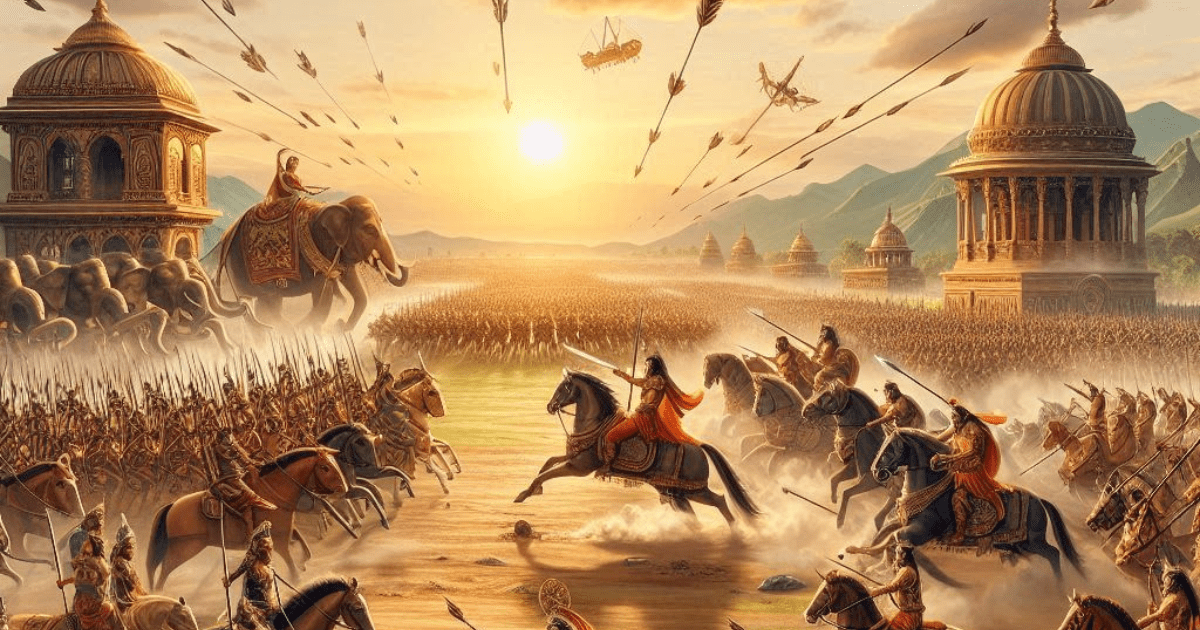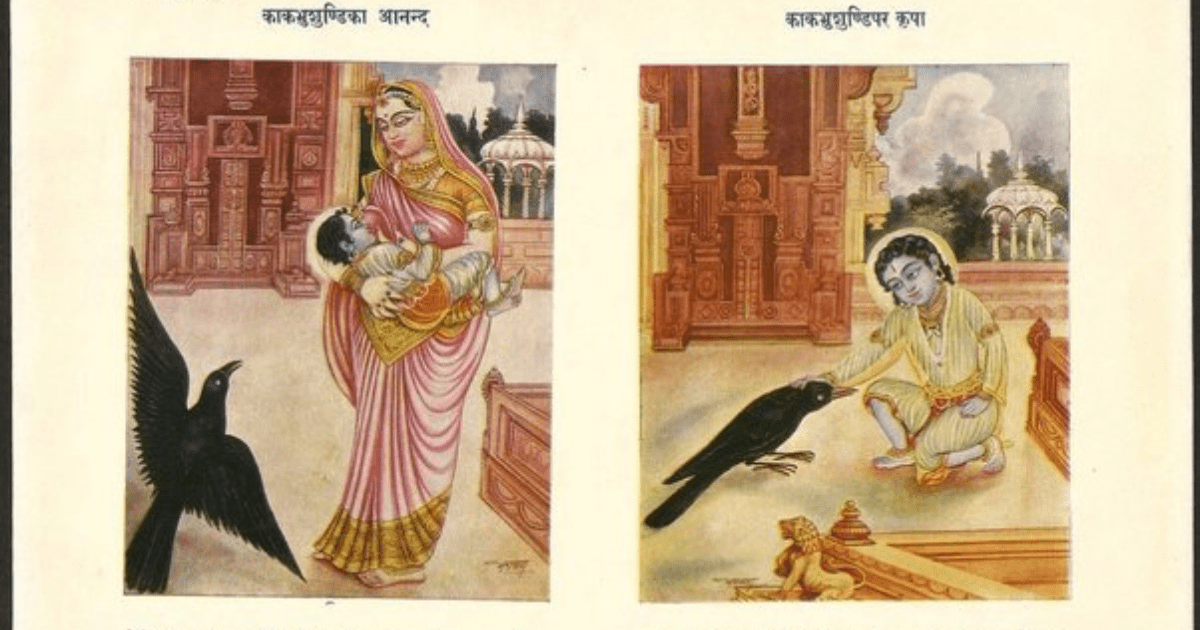If you are wondering who is Vidura in Mahabharata then you are at the right place. Vidura is a significant character in the Mahabharata who embodies wisdom and righteousness. As the half-brother of Dhritarashtra and Pandu, Vidura played a crucial role as a counselor and advisor during the Kuru dynasty. Born to Sage Vyasa, Vidura commands respect from both the Pandavas and Kauravas due to his exceptional intellect and moral integrity. Throughout the Sanskrit epic, Vidura advocates for justice and dharma, often warning against the impending doom that results from his family’s choices.
His insights are not only pivotal during the political turmoil leading to the Kurukshetra War but also resonate through his teachings, such as those found in Vidura Neethi, which emphasize the principles of governance and ethical conduct. In this blog, we will share everything about Vidura and his impact on Mahabharata. So keep reading to discover who was Vidura in Mahabharata.
Table of Contents
Who Is Vidura In Mahabharata?
Vidura, also known as Kshatri, is a central figure in the Hindu epic Mahabharata. Born to sage Vyasa and a maid, Vidura serves as the prime minister of the Kuru kingdom and the paternal uncle of both the Pandavas and the Kauravas. Throughout the epic, Vidura demonstrates wisdom, courage, and an unwavering commitment to dharma (righteousness).
He acts as a trusted advisor to the Kuru kings, particularly to his half-brother Dhritarashtra, warning him against the impending doom that results from his family’s choices. Vidura plays a crucial role in safeguarding the Pandavas, often warning them of impending dangers and providing invaluable guidance. He protests against the insult caused to Draupadi in the Kaurava court and sides with the Pandavas during the Kurukshetra War.

Vidura’s Role In Kuru Dynasty
Vidura served as a loyal minister and trusted advisor to the Kuru kings, particularly to his half-brother Dhritarashtra and his other brother Pandu. His wisdom and understanding of dharma made him a crucial figure in the royal court of Hastinapura. Vidura consistently advocated for justice and peace, often advising Dhritarashtra against making rash decisions that could lead to conflict, especially regarding the Pandavas. Despite his efforts, Dhritarashtra and his son Duryodhana often ignored Vidura’s counsel, which led to tragic consequences for the Kuru dynasty.
Vidura shared a complex relationship with his brothers. He respected Dhritarashtra but often found himself at odds with him due to Dhritarashtra’s blindness and inability to see the truth. Vidura supported Pandu’s ascension to the throne, recognizing that Dhritarashtra’s condition made him unfit for kingship. This decision, although right, caused some resentment from Dhritarashtra towards Vidura.
Vidura maintained a strong bond with Bhishma, who educated him and acknowledged his wisdom. Vidura’s loyalty to his family and commitment to dharma positioned him as a moral compass within the Kuru dynasty, influencing key events leading up to the Kurukshetra War.
Who Was Vidura In Mahabharata: His Birth and Background
According to Hindu legends, Vidura in Mahabharata was born under extraordinary circumstances due to a unique set of events. His birth was the result of a process called Niyoga, where a woman conceives a child from a man other than her husband, often to continue the family lineage. In this case, the sage Vyasa was called upon by Queen Satyavati to father children with her daughters-in-law, Ambika and Ambalika, after the death of her son, King Vichitravirya, who died childless.

However, Ambika and Ambalika were both frightened by Vyasa’s appearance, as he had just completed practicing severe austerities and was said to be “unpleasant” and “fearsome” in appearance. Ambika kept her eyes shut tight when she saw him, and Ambalika went pale with fear. As a result, their sons, Dhritarashtra and Pandu, were born with birth defects – Dhritarashtra was blind, and Pandu was jaundiced.
Eager to give birth to a worthy heir, Satyavati urged Vyasa to provide another son to Ambika. This time, Ambika sent her lady-in-waiting, Parishrami, in her place. Parishrami, unafraid of Vyasa’s appearance, bore a normal, healthy son – Vidura.
However, because his mother was a handmaiden rather than a queen, Vidura’s status was always lower than his half-brothers, Dhritarashtra and Pandu. Additionally, it is believed that Vidura was the reincarnation of Dharmaraja, also known as Yamadharmaraja, who was born as a maid’s son due to the curse of sage Mandavya.

Vidura’s Role in the Mahabharata War
Vidura played a crucial role in the events leading to the Kurukshetra War, primarily as a peace negotiator. He recognized the impending disaster that a war would bring and made earnest efforts to avert it. When Krishna visited Hastinapura as a messenger for the Pandavas, Vidura supported his mission, urging the Kauravas to consider peace. He consistently warned Dhritarashtra and Duryodhana about the dire consequences of their actions, emphasizing that their refusal to negotiate would lead to destruction. Unfortunately, his wise counsel often went unheeded.
As the conscience of the Kauravas, Vidura’s warnings to Duryodhana were particularly significant. He openly condemned Duryodhana’s actions, especially during the infamous dice game that led to the Pandavas’ humiliation. Despite being insulted by Duryodhana, Vidura remained steadfast in his commitment to righteousness. He argued that Duryodhana’s jealousy and pride would only lead to ruin. When Duryodhana disregarded his advice, Vidura made the difficult decision to resign from his position and vowed not to fight in the war, breaking his bow in a symbolic act of protest.

Vidura’s Relationship With Pandavas
Vidura in Mahabharata played a vital role in safeguarding the Pandavas throughout their trials. As a wise and compassionate figure, he acted as a protector, often warning them of impending dangers. For instance, when Duryodhana plotted to burn the Pandavas alive in the house of lac, Vidura discreetly informed Yudhishthira about the trap. He advised the Pandavas to escape, demonstrating his commitment to their safety and well-being. This protective instinct solidified their bond, as the Pandavas viewed Vidura as a trustworthy ally in their struggles against the Kauravas.
Vidura’s influence extended beyond mere protection; he also provided invaluable guidance to Yudhishthira and his brothers. He emphasized the importance of adhering to dharma, or righteousness, and often reminded them of the moral implications of their actions. Vidura’s pragmatic approach to dharma resonated with Yudhishthira, who sometimes struggled with the complexities of ethical decisions. Vidura encouraged him to be shrewd and strategic, especially in times of crisis.
Also Read: Discover The Real Name Of Mahabharata!
Vidura’s Final Journey In Mahabharata
In the final days of his life, Vidura chose to renounce worldly ties and depart from the palace, seeking spiritual fulfillment. After the devastating Kurukshetra War, he felt a deep sense of sorrow for the destruction that had unfolded. Vidura, embodying the principles of dharma, decided to leave behind the material comforts of Hastinapura and embark on a pilgrimage. This decision marked the end of his journey as a sage, as he sought to attain moksha, or liberation, through meditation and ascetic practices in the forest.
During this period, Vidura had a poignant encounter with his nephew, Yudhishthira. Their final meeting held profound spiritual significance. Yudhishthira, filled with grief and uncertainty, sought Vidura’s wisdom one last time. In this encounter, Vidura imparted his knowledge and virtues to Yudhishthira, symbolically entering his body through the practice of Yoga. This transfer of wisdom not only strengthened Yudhishthira but also deepened his understanding of dharma.
FAQs Around Vidura
Who Was Vidura In Mahabharata?
Vidura was a wise and righteous figure in Mahabharata, often serving as an advisor, and he is known for his commitment to dharma, despite facing discrimination due to his birth.
Is Vidur Brother Of Dhritarashtra?
Yes, Vidura was the half-brother of Dhritarashtra and Pandu, sharing the same father, Vyasa, but born to a maid, which affected his status within the royal family.
Who Was Vidura’s Father?
Vidura’s father was Vyasa, a revered sage and the author of the Mahabharata, who played a crucial role in the epic’s narrative and the lineage of the Kuru dynasty.
Why Did Vidura Not Participate In The War?
Vidura did not participate in the Kurukshetra war due to Duryodhana’s harsh accusations against him, which led to his decision to break his bow and withdraw from the conflict, siding with the Pandavas instead.
Conclusion
Vidura in Mahabharata stands out as a remarkable figure in the Mahabharata. His wisdom, integrity, and commitment to dharma make him a significant figure in the Sanskrit epic. As a loyal advisor to the Kuru kings, he consistently sought to promote justice and peace, even in the face of adversity. His protective nature towards the Pandavas showcases his deep sense of responsibility and love for his family. In this post, we shared everything you must know about Vidura answering the most asked question on the internet, who is Vidura in Mahabharata? If you liked reading this don’t forget to check out more interesting blogs around Mahabharata.



I’ve always admired how Vidura stayed true to dharma even when it meant going against his own family. Great article 🙌. Does a really good job at capturing his essence.